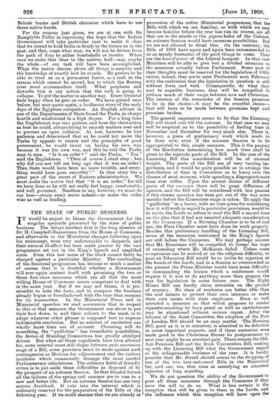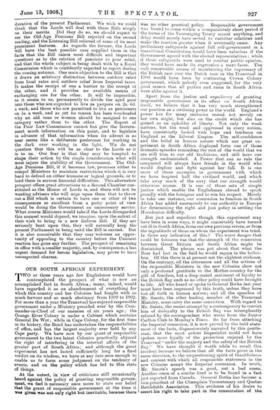THE STATE OF PUBLIC BUSINESS.
IT would be unjust to blame the Government for the singular spectacle presented by the state of public business. The delays incident first to the long absence of Sir H. Campbell-Bannerman from the House of Commons, and afterwards to the Ministerial changes following upon his retirement, were very unfavourable to despatch, and their natural ill-effect has been made greater by the vast programme set out in the King's Speech and amplified since. Even this last cause of the block cannot fairly be charged against a particular Ministry. The overloading of the Sessional programme has become so much a matter of course that it is doubtful whether a Government will ever again content itself with promising the two or three first-class measures which are all that the most willing House of Commons seems competent to deal with in the same year. But if we may not blame, it is per- missible to note the facts, and to compare the business already begun or foreshadowed with the time that remains for its transaction. In the Ministerial Press and in Ministerial speeches we read assurances that in respect to this or that measure the Government are about to put their foot down, to nail their colours to the mast, or to adopt whatever other phrase is supposed best to express indomitable resolution. But no amount of resolution can wholly leave time out of account. Closuring will do something, the " guillotine " has formidable possibilities, the device of Standing Committees has greatly abridged debate. But when all these expedients have been allowed for, some interval must still elapse between each successive stage of a Bill, some provision must be made against such contingencies as Motions for adjournment and the various incidents which occasionally derange the most careful Parliamentary calculations. The ordinary habit of friendly critics is to put aside these difficulties as disposed of by the prospect of an autumn Session. In that blissful future all the failures of the spring and summer are to rise to a new and better life. But an autumn Session has one very serious drawback. It cuts into the interval which is ordinarily reserved for the preparation of the Bills of the following year. If we could assume that we are already in possession of the entire Ministerial programme, that the Bills with which we are familiar, or with which we may become familiar before the year has run its course, are all that are in the minds or the pigeon-holes of the Cabinet, an autumn Session would have immense possibilities. But we are not allowed to think this. On the contrary, the Bills of 1908 have again and again been recommended to us as merely foretastes of the good things to come. They are the hors-d'ceuvre of the Liberal banquet. In that case Ministers will be able to give but a divided attention to the measures actually before Parliament. Some part of their thoughts must be reserved for the legislation of 1909, unless, indeed, they are to meet Parliament next February with the confession that the legislation in question is still without form and void. Consequently, do what they may to expedite business, they will be compelled to jettison much of their cargo between now and Christmas. The interest of the remainder of the Session promises to lie in the choice—it may be the eventful choice— that will have to be made 'between promises kept and promises broken.
The general impression seems to be that the Licensing Bill will stand over till the autumn. In that case we may well be sceptical as to the possibility of finding time in November and December for very much else. There is, however, a piece of preliminary work which needs to be done now, even if the autumn Session is to be appropriated to this single measure. This is the passing of the Resolution determining how much time shall be given to the separate parts of the Bill. In the case of the Licensing Bill this consideration will be of unusual weight. The parts of the Bill are of very varying im- portance, and it would be quite possible so to arrange the distribution of time in Committee as to hurry over the clauses of most moment, while spending a disproportionate time over trifles. Upon the several claims of different parts of the measure there will be great difference of opinion, and the Bill will be considered with less passion if this stormy question has been got out of the way some months before the Committee stage is taken. To apply the "guillotine " in a hurry, with no time given for considering how it will work in regard to particular provisions, would be to invite the Lords to refuse to read the Bill a second time on the plea that it had not-received adequate consideration in the Commons. If a Revising Chamber is to be of real use, the First Chamber must have done its work properly. Besides this preliminary handling of the Licensing Bill; seven of the measures mentioned in the King's Speech are still before the Commons. We may perhaps assume that Mr. Runcimau will be compelled to forego his hope of succeeding where Mr. McKenna failed. Unless some compromise can be arrived at on the religious difficulty, to pass an Education Bill would be to invite its rejection at the hands of the Lords, and in a Session so overcrowded as the present the Prime Minister would have some difficulty in commanding the leisure which a conference would require if it was to do anything more than prepare the way for legislation in some future year. The Eight Hours Bill can hardly claim attention on the ground of urgency. No class of workmen are better able than the coal miners to protect their own interests or make their own terms with their employers. Even so well intended a measure as that which proposes to render cigarette-smoking by boys penal as well as unwholesome may be abandoned without serious regret. After the labours of the Joint Committee, the adoption of the Port of London Bill should be an easy matter. The Housing Bill, good as it is in intention, is admitted to be defective in some important respects, and if these omissions were made good in the Christmas Recess its postponement to next year might be an eventual gain. There remain the Old- Age Pensions Bill and the Irish Universities Bill, making up with the Licensing Bill what the Government regard as the indispensable business of the year. It is hardly possible that Mr. Birrell should assent to the dropping of one of the two best-welcomed Bills in the Ministerial list, and one, too, that aims at remedying an admitted injustice of long standing.
We do not question the ability of the Government to pass all these measures through the Commons if they have the will to do so. What is less certain is the reception that will be given to them in the Lords, and the influence which this reception will have upon the duration of the present Parliament. We wish we could think that the Lords will deal with these Bills simply on their merits. Did they do so, we should expect to see the Old-Age Pensions Bill rejected on the second reading, and the Licensing Bill relieved of some of its most prominent features. As regards the former, the Lords To have the best possible case supplied them in the facts that the Bill raises most difficult and important questions as to the relation of pensions to poor relief, and that the whole subject is being dealt with by a Royal Commission which is confidently expected to report during the coming autumn. One main objection to the Bill is that it draws an arbitrary distinction between outdoor relief from local rates and outdoor relief from Imperial taxes. It makes the receipt of one a barrier to the receipt of the other, and it provides no available means of exchanging one for the other. It will be impossible, as it seems to us, permanently to divide the aged poor into those who are expected to live as paupers on 2s. 6d. a week, and those who are permitted to live as pensioners on 5s. a week, and as yet no reason has been vouchsafed why an old man or woman should be assigned to one category rather than to the other. The Report of the Poor Law Commission cannot but give the Govern- ment much information on this point, and to legislate in advance of that information when its advent is so near seems like a deliberate preference for working in the dark over working in the light. We do not question that this will be as clear to the Lords as it is to us. Our fear is that they may be tempted to shape their action by the single consideration what will most injure the stability of the Government. The Old- Age Pensions Bill, if it becomes law, promises either to compel Ministers to maintain restrictions which it is very hard to defend on. either humane or logical grounds, or to land them in serious financial difficulties. This alternative prospect offers great attractions to a. Second Chamber con- stituted as the House of Lords is, and there will not be wanting advisers who will urge upon them that to throw out a Bill which is certain to have one or other of two consequences so excellent from a party point of view would be doing the Government an unnecessary service. What course Ministers would take if the Lords disregarded this counsel would depend, we imagine, upon the extent of their wish to bring in a new Reform Bill. If they are seriously bent upon this, they will naturally keep the present Parliament in being until the Bill is carried. But it is also conceivable that they may welcome an oppor- tunity of appealing to the country before the Unionist reaction has gone any further. The prospect of remaining in office with a smaller majority, and, by consequence, a less urgent .demand for heroic legislation, may prove to have unsuspected charms.







































 Previous page
Previous page